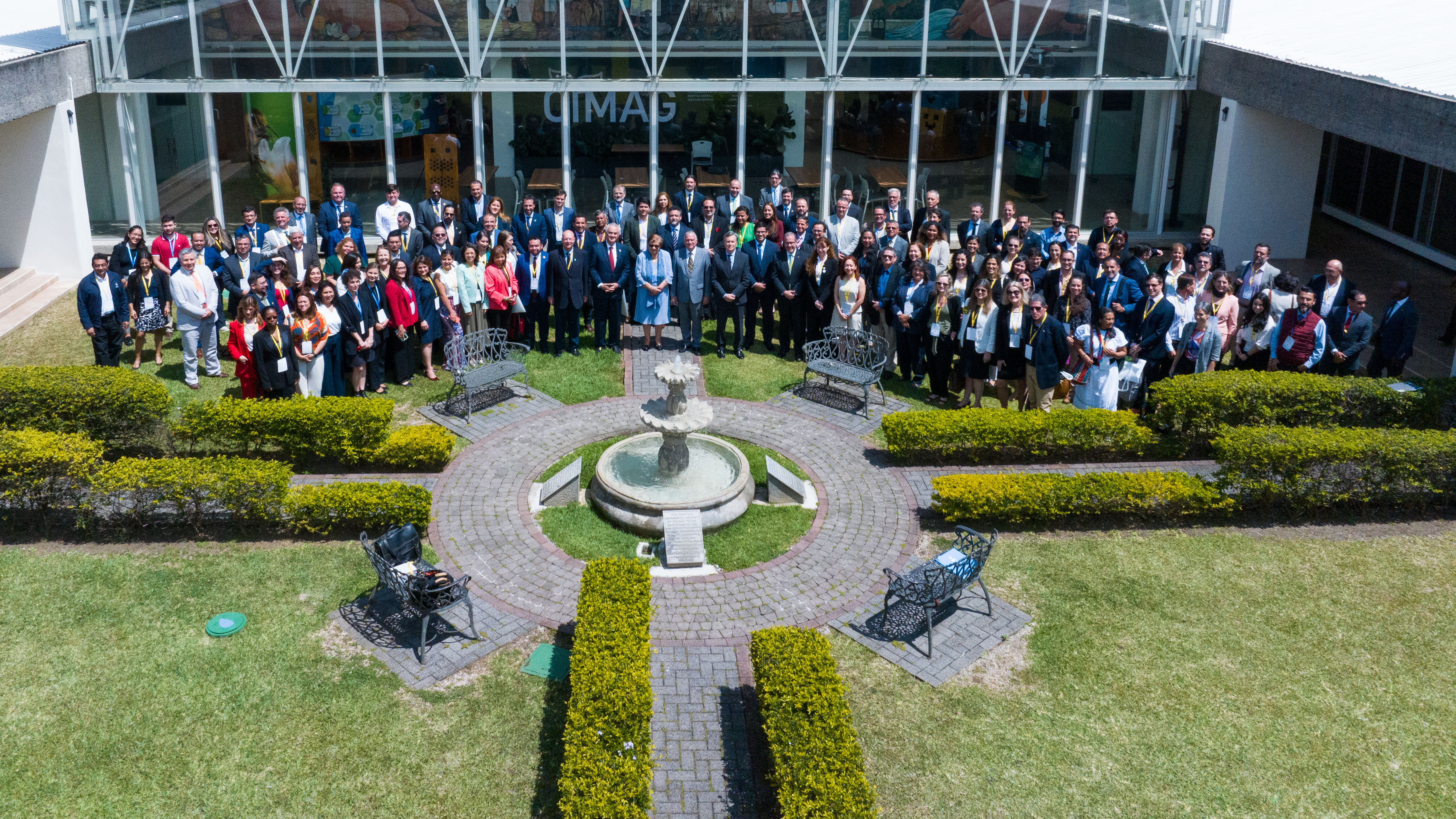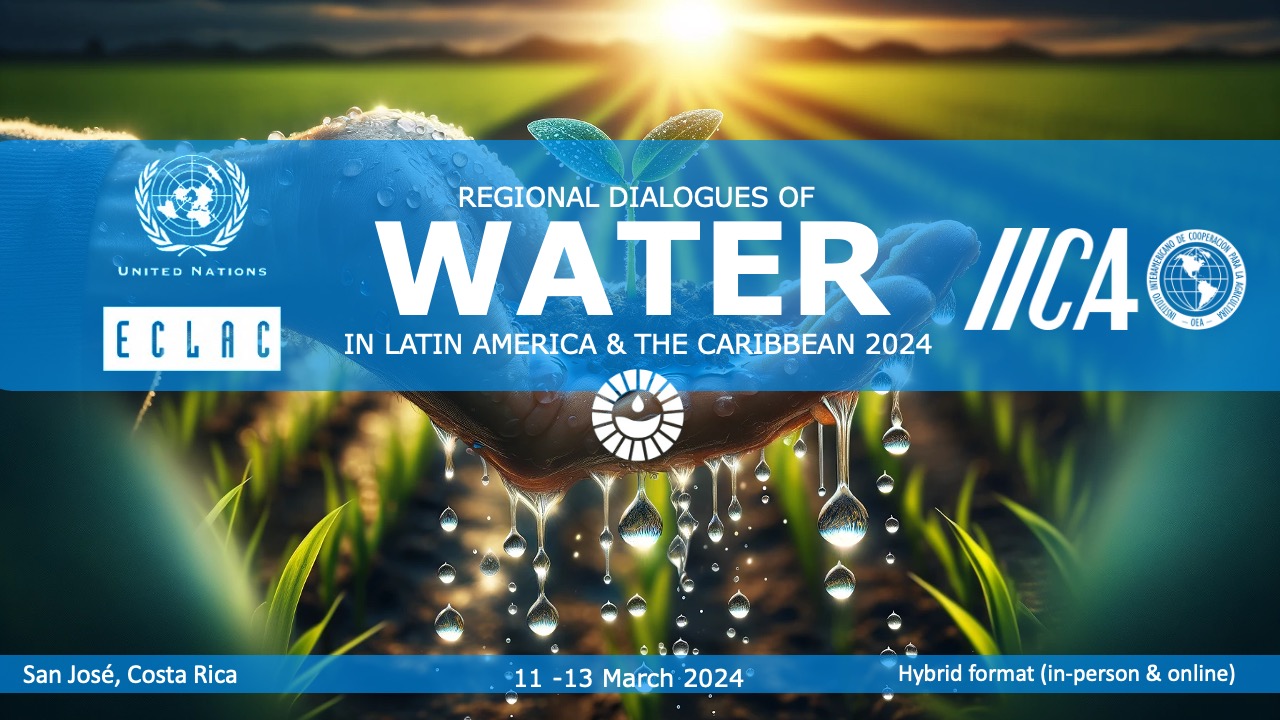Proper Water Management Allows for Energizing Sustainable Development, Increasing Equality, Improving Adaptation to the Climate Crisis and Facilitating Peace
Work area(s)
Topic(s)
Today the fourth edition of the Regional Water Dialogues in Latin America and the Caribbean began in San José, Costa Rica, organized by ECLAC in collaboration with IICA.

“Proper water management is an urgent imperative: it is a strategic and energizing sector for sustainable development, a source of greater equality, an adaptation solution in the face of the climate crisis, and an essential facilitator of the peace that we all long for,” according to the authorities present at the opening session of the fourth edition of the Regional Water Dialogues in Latin America and the Caribbean 2024, which is taking place from March 11-13 in San José, the capital of Costa Rica.
This high-level meeting is organized by the Economic Commission for Latin America and the Caribbean (ECLAC) and the Inter-American Institute for Cooperation on Agriculture (IICA), and is being attended by government authorities, Ministers and Deputy Ministers, and more than a hundred representatives from 18 countries in the region, from the public and private sectors, international organizations, development banks, academia and civil society.
The event integrates a high-level ministerial space, with exchanges of technical experiences with a multi-stakeholder approach, in order to promote good practices and further the achievement of Sustainable Development Goal (SDG) 6 in the region, which seeks to “ensure the availability and sustainable management of water and sanitation for all.” On this occasion, a high-level session on water and agriculture will be held to seek out high-impact solutions on water resources, taking into account that the agricultural sector is the main water consumer, with a consumption share of over 70%.
The gathering was inaugurated on Monday, March 11 by Doris Gutiérrez, Presidential Designee of Honduras, the country that holds the pro tempore presidency of the Community of Latin American and Caribbean States (CELAC); Arnoldo André Tinoco, Minister of Foreign Affairs of Costa Rica; José Manuel Salazar-Xirinachs, Executive Secretary of ECLAC; and Manuel Otero, Director General of IICA.
In his opening remarks as organizer of the event, José Manuel Salazar-Xirinachs indicated that water is not only essential for life but also for achieving sustainable development in our countries. “That is why we seek to share experiences, but above all to propose concrete actions and strengthen the commitments made in regional and global spheres to ensuring the availability and sustainable management of water and sanitation for all, in a context of various cascading crises and climate change,” he stated.
ECLAC’s Executive Secretary highlighted the relevance of the Regional Water Action Agenda, adopted in Santiago, Chile in February 2023 during the previous edition of the Dialogues. This document summarizes the main voluntary commitments and courses of action agreed upon by Latin American and Caribbean countries for furthering and accelerating effective progress on implementation of SDG 6 during the second half of the United Nations Decade for Action on Water 2018-2028.
“This Regional Water Action Agenda constitutes a call to action for mobilizing all the political, technical and financial resources available in and for the region in order to promote a sustainable and just water transition with four pillars of simultaneous action: 1) to guarantee the human right to safe drinking water and sanitation; 2) eliminate water poverty; 3) reduce overexploitation and water-related conflicts; and 4) promote innovation and the circular economy of water,” he stated.
“One important necessity is to accelerate the investments required for infrastructure provision, maintenance and operation that would close the gaps in access to safe water and sanitation services. ECLAC has estimated that to provide universal coverage of safely managed water and sanitation for the population by 2030, on average countries would have to invest 1.3% of their Gross Domestic Product annually for 10 years, which would create 3.8 million green jobs a year and would increase gross value added by 1.6%,” Salazar-Xirinachs indicated.
Meanwhile, Manuel Otero emphasized that water action is synonymous with action for sustainable development and action for life. “Our continent is the main net exporter of agricultural and food products in the world. This is an enormous responsibility because the need to carry forward food security and the planet’s environmental sustainability falls on our shoulders,” he stated.
“Water is central, it is a priority defined by authorities for establishing partnerships. That is why anything that facilitates dialogue, knowledge exchange and promotes the implementation of innovative solutions is central. Therein lies the importance of the partnership with ECLAC, with the IDB, the World Bank, the University of Nebraska, CAF, CATIE – no one can be left out, we must act together to resolve some of the problems that are limiting sustainable development,” IICA’s Director General emphasized.
Doris Gutiérrez, meanwhile, stressed the fact that the diagnosis of the water problem has already been made. “What we have to do now is act, put those diagnoses into practice,” she declared. The Presidential Designee of Honduras gave special recognition to the role of women in the matter of water. “The best water managers and administrators are us women, not men. Many times they are humble people who are not only vulnerable, but also infringed upon. But we women are not vulnerable; on the contrary, we have the strength to give life,” she said.
“The whole problem of food and water must be viewed in a holistic, circular way. But that involves a better distribution of resources. Water access should not be only for those who can pay for it. We must also seek storage systems to not lose out on rainwater, for example. In addition, policies must be made from the bottom up, with the participation of those most affected. I urge you to be more proactive and linked to the needs of the people. All of this will lead us to real peace,” she indicated.
Finally, Costa Rican Foreign Minister Arnoldo André Tinoco said that in light of the shared challenges faced by the region, it is crucial to foster the exchange of experiences that would promote best practices and contribute to the fulfillment of SDG 6 in the interest of achieving universal and equitable access to drinking water and to adequate sanitation and hygiene services, as well as improving water quality at a global level.
“We are aware of the vulnerability of our region, especially with regard to climate change and water crises. That is why it is imperative that we work to manage and reduce the risks associated with natural phenomena, strengthening our systems for early warning, response, mitigation, adaptation and rehabilitation vis-à-vis water-related disasters,” he explained.
Over the three days of work at the Regional Water Dialogues 2024, participants will review implementation of the Regional Water Action Agenda approved in 2023, with the aim of: i) analyzing the progress and challenges of achieving SDG 6; and ii) highlighting successful experiences and lessons learned for achieving that objective.
Related content
IV Edición de los Diálogos Regionales del Agua en América Latina y el Caribe 2024: Hacia el Foro Mundial del Agua 2024
Palabras de apertura de José Manuel Salazar-Xirinachs, Secretario Ejecutivo de la CEPAL.
IV Edition of ECLAC's Regional Water Dialogues in Latin America and the Caribbean
Register and save the date! The fourth edition of the Regional Water Dialogues of Latin America and the Caribbean will be held in hybrid form (face-to-face and virtual) in San José, Costa Rica, from…

Latin American and Caribbean Countries Reaffirm their Commitment to the Regional Water Action Agenda
The Regional Water Dialogues 2024 concluded today in Costa Rica, having drawn the participation of more than 1,000 people from 37 countries in the region and the world.
Related link(s)
Country(ies)
- Latin America and the Caribbean
Contact
Public Information Unit
- prensa@cepal.org
- (56 2) 2210 2040